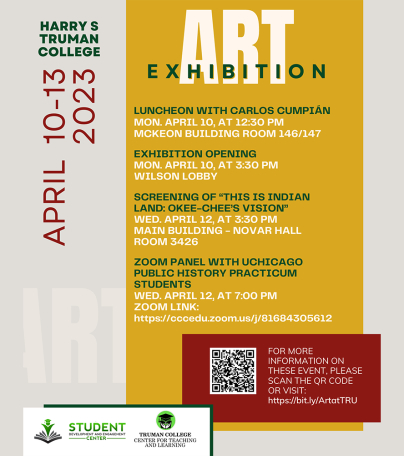Jose Luis Benavides (MFA '17) has orrganized an event series at Truman City College of Chicago for the exhibition Anišinabe Waki-Aztlán.
Delving into shared Indigenous and Chicanx cultural histories, Anišinabe Waki-Aztlán was a 1977 art exhibition originally held at Harry S. Truman College. The exhibition featured Indigenous and Chicano artists, organized by Movimiento Artístico Chicano (MARCh) & the Chicago Indian Artist Guild. Anišinabe Waki-Aztlán featured a total of 52 participating artists, lectures, poetry readings, and performances, with lead organizer Carlos Cumpián. Featured artists included Malu Alberro y Ortega,, Loniel Poco, Sharon Okee-Chee Skolnic, Salvador Vega, Robin Whitespear, Joe Yazzie, and many more. The event poster was made by Carlos Cortéz Koyokuikatl.
This re-creation and celebration of the original exhibition includes images Truman College art lecturer, Jose Luis Benavides, gathered since 2019. His research into this little-documented Chicago history started with a grant from the Illinois Humanities, with presentations and screenings at local-Chicago art spaces Chuquimarca and Comfort Station in 2022. He was also awarded a “Service-Learning and Civic Engagement Faculty Research Fellowship” from The Service-Learning and Civic Engagement Consortium (SLCEC) to expand this research.
With the support of the University of Chicago’s Public History Practicum, three graduate students, Mariah Bender, Teagan Harris, and Zi Yun Huang, created a digital archive of artworks related to Anišinabe Waki-Aztlán with special access to Carlos Cumpián’s private collection.
This Truman campus exhibition includes research materials of brochures, flyers, photographs, woodcut prints, graphics, and poetry chapbooks from some of the original artists involved in the 1977 exhibition.
A special screening of the film This is Indian Land: Sharon Okee-Chee’s Vision will share the rich history of The American Indian Center, in Chicago. Truman students and the community are invited to learn about the important cross-cultural solidarity work sustained by Chicanx and Indigenous elders in Chicago.

